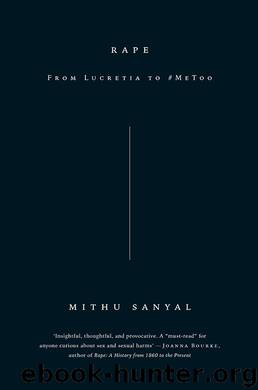Rape by Mithu Sanyal

Author:Mithu Sanyal
Language: eng
Format: epub
Publisher: Verso Books
She calls the rules and regularities that assign each of us our position in these narratives the “gendered grammar of violence,” noting that “to take male violence or female vulnerability as the first and last instances in any explanation of rape is to make the identities of rapist and raped preexist the rape itself.”
When making political demands, it seems necessary to postulate the special vulnerability of women (and children) and by extension their special need for protection. But this is a double-edged sword: by defining a political subject as vulnerable (and thereby worthy of protection, but at the same time needing protection) we take away their status as subject and make them into an object to be protected. “To experience the body as itself essentially weak is to necessitate placing it under constant surveillance,”24 Ann Cahill points out: a catch-22.
But, after all, human bodies are vulnerable. It’s the shock of noticing one’s own vulnerability, and realizing that protection is always relative and never absolute, that has historically led to the allocation of this universal vulnerability only to certain bodies—bodies perceived as female, or racialized bodies that have to be “saved” (from their primitive state, from their oppressive fathers/husbands, etc.) and so on. This opens up a difference between bodies in need of protection (vulnerable) and protecting/controlling bodies (invulnerable), as if it were impossible to be both at the same time, whereas humans are always everything: needy and self-determining, autonomous and dependent, and everything in between.
That’s why philosopher Judith Butler calls for a redifinition of vulnerability: to stop seeing it as a characteristic of the other, but rather as an integral part of the self—a self that, by recognizing its own vulnerability, becomes able to have empathy for other people’s vulnerability without turning them into objects (of protection). In an analogy to the platitude that “you can only truly love other people when you love yourself,” Butler declares that we can only truly feel empathy for others when we are allowed empathy with ourselves. This turns vulnerability from a weakness into a resource that makes us profoundly human.25
Download
This site does not store any files on its server. We only index and link to content provided by other sites. Please contact the content providers to delete copyright contents if any and email us, we'll remove relevant links or contents immediately.
The Rules Do Not Apply by Ariel Levy(4969)
On the Front Line with the Women Who Fight Back by Stacey Dooley(4873)
The Lonely City by Olivia Laing(4802)
Bluets by Maggie Nelson(4556)
The Confidence Code by Katty Kay(4260)
Three Women by Lisa Taddeo(3434)
Not a Diet Book by James Smith(3427)
Inferior by Angela Saini(3316)
Confessions of a Video Vixen by Karrine Steffans(3309)
A Woman Makes a Plan by Maye Musk(3254)
Pledged by Alexandra Robbins(3179)
Wild Words from Wild Women by Stephens Autumn(3153)
Nice Girls Don't Get the Corner Office by Lois P. Frankel(3044)
Brave by Rose McGowan(2823)
Women & Power by Mary Beard(2767)
Why I Am Not a Feminist by Jessa Crispin(2760)
The Girl in the Spider's Web: A Lisbeth Salander novel, continuing Stieg Larsson's Millennium Series by Lagercrantz David(2721)
The Clitoral Truth: The Secret World at Your Fingertips by Rebecca Chalker(2720)
I Who Have Never Known Men by Jacqueline Harpman(2670)
